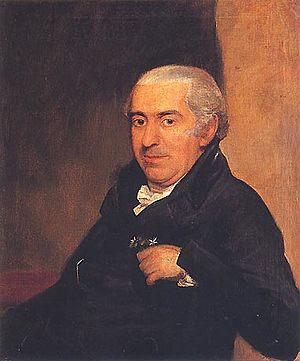José Correia da Serra facts for kids
Quick facts for kids
José Correia da Serra
|
|
|---|---|

Abbé Correa, by Domenico Pellegrini (1759–1840).
|
|
| Born | 6 June 1750 Serpa, Kingdom of Portugal
|
| Died | 11 September 1823 (aged 73) Caldas da Rainha, Kingdom of Portugal
|
| Nationality | Portuguese |
| Occupation | Abbot, philosopher, diplomat, politician and scientist |
José Francisco Correia da Serra (born June 6, 1750 – died September 11, 1823) was a very smart and talented Portuguese man. He was an abbot (a type of religious leader), a polymath (someone who knows a lot about many different subjects), a philosopher (someone who thinks deeply about life), a diplomat (someone who represents their country in other nations), a politician, and a scientist. Sometimes, people called him Abbé Correa. A type of plant from Australia, called Correa, is even named after him!
Contents
Life and Travels
Early Life and Education
José Correia da Serra was born in a place called Serpa, in Alentejo, Portugal, in 1750. He studied in Rome, Italy, where he became a priest (this is what "took holy orders" means).
In 1777, he went back to Lisbon, the capital of Portugal. There, he helped start the Academia das Ciências de Lisboa (the Royal Academy of Sciences of Lisbon) in 1779. This was a very important group for science in Portugal.
Challenges in Portugal
Correia da Serra wrote many things that were published. However, some of his ideas caused problems with powerful religious and political leaders in Portugal. These leaders had very traditional views and didn't like new ideas.
Because of these difficulties, he had to leave Portugal.
Time in England and Sweden
In 1786, he went to France. He stayed there until the Portuguese King-consort Pedro III died. Then, he returned to Portugal, but more political problems forced him to leave again.
This time, he went to England. There, he found a friend and helper in Sir Joseph Banks. Sir Joseph Banks was the head of the Royal Society, a famous scientific group in England. With Sir Joseph's help, Correia da Serra easily became a member of the Royal Society. In 1797, he was also chosen as a foreign member of the Royal Swedish Academy of Sciences in Sweden.
Journey to America
In 1797, Correia da Serra was given a job as a secretary for the Portuguese embassy (a country's official office) in London. But he had an argument with the ambassador (the main diplomat), so he left that job.
He then traveled to the United States with two famous Polish people: a military leader named Thaddeus Kosciusko and a poet named Julian Ursyn Niemcewicz. They sailed from Bristol and arrived in Philadelphia on August 18, 1797.
Return to Europe and Back to America
Correia da Serra eventually went back to Paris, France, in 1802 and stayed there for eleven years. In 1812, he was chosen to be a member of the American Philosophical Society, another important scientific group.
In 1813, he left Europe again for the New World (the Americas). He first arrived in New York City. He then settled in Philadelphia, where he gave talks about botany (the study of plants) at the University of Pennsylvania.
He also visited Monticello, the home of former US President Thomas Jefferson, several times. President Jefferson liked Correia da Serra's political ideas a lot. In 1815, he was made an honorary member of the American Academy of Arts and Sciences.
Diplomat in Washington D.C.
In 1816, he became the Portuguese minister-plenipotentiary (a top diplomat) in Washington D.C., the capital of the United States. However, he actually lived in Philadelphia.
Final Years in Portugal
In 1820, he was called back to Portugal. There, he was made a member of the financial council (a group that advises on money matters). He was also elected to a seat in the "General Extraordinary and Constituent Cortes of the Portuguese Nation." The Cortes was like a parliament or a special assembly that helped write a new constitution for Portugal.
Sadly, he died just three years later, in 1823.
See also
- Royal Society – Correia da Serra became a member of this famous scientific group in 1795. His membership records can be found on the Royal Society website. Some of the important people who signed his nomination were James Edward Smith, Aylmer Bourke Lambert, and James Rennell.
 | Jessica Watkins |
 | Robert Henry Lawrence Jr. |
 | Mae Jemison |
 | Sian Proctor |
 | Guion Bluford |

